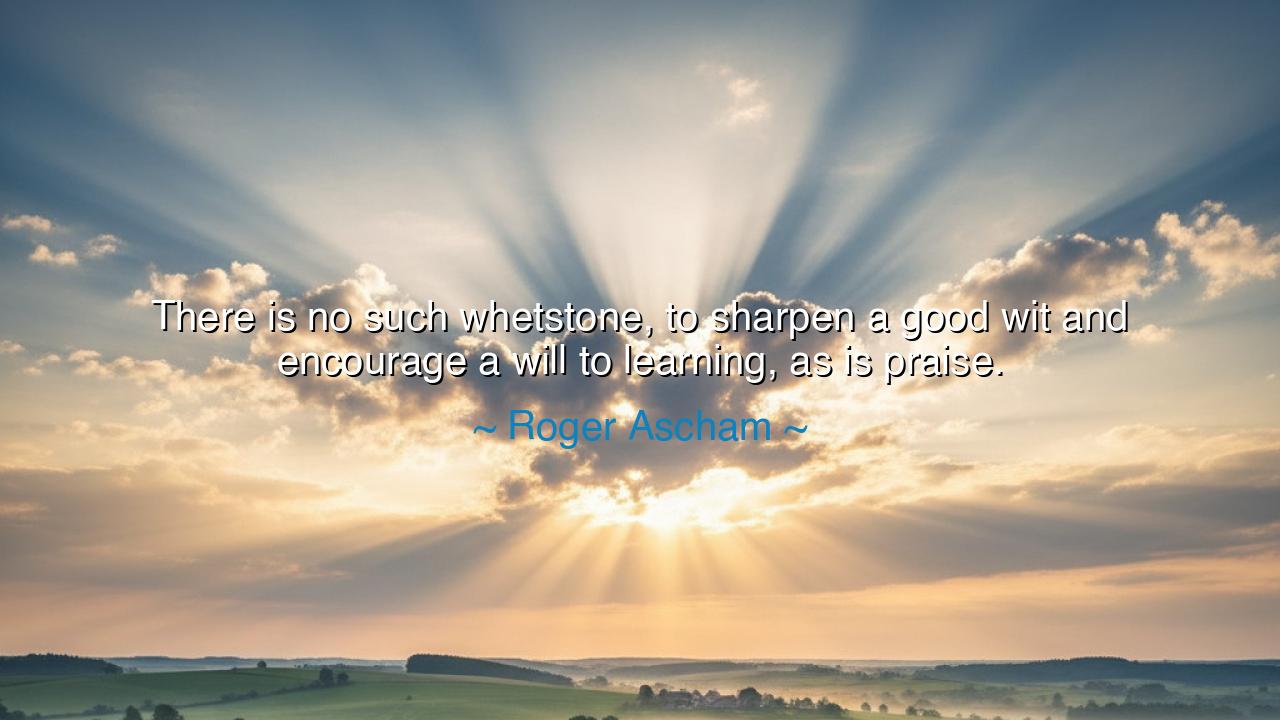
There is no such whetstone, to sharpen a good wit and encourage a
There is no such whetstone, to sharpen a good wit and encourage a will to learning, as is praise.






When Roger Ascham wrote, “There is no such whetstone to sharpen a good wit and encourage a will to learning as is praise,” he was speaking from the heart of the Renaissance — a time when the minds of men were awakening after centuries of shadow, and the art of education was being reborn. Ascham, tutor to the young Queen Elizabeth I, was a master of the human spirit as well as of language. He knew that the flame of intellect does not burn by force or fear, but by warmth and encouragement. In this sentence — bright and humble as a proverb — he captured an eternal truth: praise is the sharpest tool of growth, the whetstone that polishes both the wit and the will of the learner.
To understand this quote is to understand how learning truly unfolds. A whetstone sharpens the blade, not by crushing it, but by touching it with patience and purpose. So too, the mind becomes keen not through harshness or punishment, but through recognition and affirmation. Praise, when sincere and well-placed, transforms effort into joy and discipline into devotion. Ascham, who observed the royal pupil Elizabeth’s precocious mind, saw firsthand that the human soul blooms under approval. Her wit was not dulled by fear of failure, but sharpened by the confidence of her teacher’s belief in her.
In the ancient world, this principle was well known to the wise. The philosopher Aristotle taught that the highest form of education nurtures not only reason but also the heart, and that virtue grows best in an atmosphere of goodwill. Similarly, in the East, Confucius instructed his disciples through gentle correction and affirmation, calling forth their potential with encouragement rather than rebuke. Like Ascham centuries later, these sages understood that praise is nourishment — it feeds the desire to learn, while criticism alone starves it. For the mind, like the body, cannot grow strong on deprivation.
History offers countless examples of how praise has kindled greatness. When Michelangelo was young, he carved a small faun from stone. His master, Lorenzo de’ Medici, instead of finding fault, smiled and praised his work. That moment of recognition lit a fire that would never fade. The sculptor later said that the encouragement of his teacher taught him more than years of training ever could. Praise, when given to a worthy spirit, becomes not flattery, but fuel for genius. It sharpens the mind and strengthens the heart, transforming talent into triumph.
Yet Ascham’s wisdom carries a second truth — that praise must be just and discerning. False praise flatters, but true praise awakens. The teacher or leader must recognize genuine effort, not idle vanity. Praise that is unearned makes the will lazy; praise that is earned makes it soar. Ascham’s words remind us that the best learning is born from harmony — where challenge and encouragement are balanced like light and shadow. The whetstone does not shatter the blade; it strengthens it through friction, guided by care. So must the teacher guide the learner: with firmness, but always with belief.
In his time, Ascham stood against the cruelty of harsh schooling, which ruled by fear and humiliation. Many tutors of the sixteenth century believed that a rod could produce obedience, but Ascham believed only praise could produce wisdom and love of learning. His philosophy shaped the mind of Elizabeth I, whose brilliance and composure would later make her one of the most learned and capable monarchs in history. Thus, the truth of his words was proved not only in theory, but in the life of a queen who learned through joy, not through terror.
The lesson of this quote is both timeless and tender: the way we teach is the way we build souls. Whether we are parents, mentors, or friends, we hold in our words the power to sharpen or to dull, to build or to break. Praise sincerely, and you will see courage rise where there was hesitation. Recognize the smallest effort, and you will witness greater ones to come. Be the whetstone that sharpens others — not through ridicule or cold correction, but through trust, kindness, and hope.
So let us remember this: praise is not weakness, but strength rightly spoken. It is the sun that draws forth the flower, the breath that awakens the ember. Ascham’s wisdom endures because it speaks to every age — that the human mind, no matter how great or humble, grows best when it is loved into learning. Let your praise be thoughtful, your encouragement genuine, and your belief unwavering, for in doing so, you do not merely teach — you awaken greatness.






AAdministratorAdministrator
Welcome, honored guests. Please leave a comment, we will respond soon